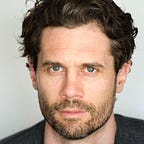Music For Men: The War On Drugs
These are hard times for men.
Everywhere we look, we’re told how loutish, how silly, how behind the times we are.
Three-quarters of successful sitcoms feature a foolish male lead. There’s a book, called The End Of Men (And The Rise Of Women), about our impending irrelevance. We can’t even count on Clint Eastwood anymore.
Nowhere is our plight more evident than in the state of the rock ’n’ roll, all keyboards and skinny pants and falsetto voices backed by falsetto-y-er synthesizers.
Passion Pit. Neon Indian. Yeasayer. Young The Giant. Perfume Genius. Gotye.
Perfect for washing down that morning kale-and-Goji smoothie.
But manly?
Hardly.
When I think of music that’s manly, I think of Waits, Springsteen, Fogerty, Cash.
Cigarettes & whiskey. Cuts & bandages. Hope & despair.
Stray women, stray kids, stray emotions.
This is what men sing about.
Being a man is being a romantic. It’s hoping that in all your bumbling around, you may yet stumble across a solution. It’s not knowing what you’re doing, even as everyone expects you to. It’s getting up over and over, even though you’re the one knocking yourself down.
Which is just the sort of paragraph that might go a long way in describing the feel of the music made by Philadelphia’s The War On Drugs: a bastion of hope in a man’s musical dirtfield.
The War On Drugs were singer-guitarist Kurt Vile’s band first. Or at least that’s the way I read the situation.
Vile is the ultimate man’s musician. He’s all contradictions: sings like broken glass; looks like a Gap model. Writes about love while simultaneously convincing everyone listening that he’s destined to be alone forever.
Vile left the The War On Drugs after the band’s debut, Wagonwheel Blues, going on to release two of the best albums of the past five years, Childish Prodigy (2009) and Smoke Ring For My Halo (2011).
It could be because I discovered Vile first, and worked my way backward to The War On Drugs that I think to say that Vile left his mark on the band. The truth is, it could very well be the other way round.
Not that it matters much. As a Kurt Vile fanatic, here’s what I like about The War On Drugs:
Same melancholic sturdiness, more rock.
I caught The War On Drugs in Chicago, on the Friday night of Lollapalooza. I was gassed after a day in the sun, and despite my longtime love for Vile and anything he’s ever touched, I assumed that I’d only survive for 30 minutes. But I was mesmerized and an hour in I was turning to a friend and saying, “I could sit in a bar, drink bourbon, and listen to this every Friday night for the rest of my life.”
I thought of muscle cars and switchblades and all those early scenes in Deer Hunter, when the coal miners’ kids are just trying to have a decent wedding.
Because that, you see, is what everyone doesn’t get about us — about men. We never even asked to be on top. But if someone was going to put us there, we figured we’d do the best we could.
Which is why no one’s going to get much complaint from us, when it comes to stepping aside.
It’s no fun at the front of the charge.
We’re perfectly happy at the back.
Of the bar, that is, listening to The War On Drugs and smiling on the inside, because at least a few dudes from Philadelphia understand us, even if no one else does.
Originally published at www.flipcollective.com on September 11, 2012.
